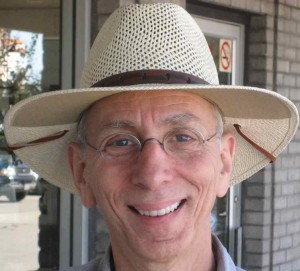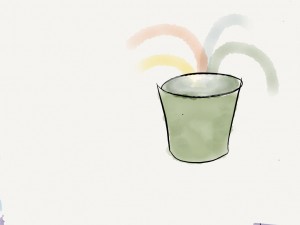
As I noted earlier, I’m starting to record a set of podcasts about the role of social media in international development. (That’s a long title, so for the future, the title slug will be Social Media in Intl. Dev: Podcast with NAME.)
Today’s podcast is with William (Bill) Anderson and focuses on the science and research aspect of international development. This fascinates me because of the work I do for the Consultative Group on International Agricultural Research (CGIAR), the Food and Agricultural Organization of the UN (FAO) and the International Fund for Agricultural Development (IFAD, and also a UN organization). Our conversation was so interesting to me that I did two. The second one is on Twitter and science. That will come out in a few days.
First, a little bit about Bill
I know Bill from a number of contexts, but most near and dear to my heart has been conversations about conflict online and things we have tagged “usthem.” But Bill is also an engineer and scientist with a keen eye on the role of technology. Here is his bio:
William L. (Bill) Anderson is a cofounder of Praxis101, a consultancy that focuses on participatory, user-centered information systems design, software engineering practice innovation, and organizational learning. Before founding Praxis101 Bill worked for Xerox Corporation in distributed system architecture, technology strategy, and advanced
product development. He pioneered co-development and customer collaboration on one of the first digital libraries, a joint project between Cornell University and Xerox known as the CLASS project (http://www.clir.org/pubs/reports/joint/). He has published papers on digital library product development, participatory design of product prototypes, and software development practices and tools. Prior to Xerox, he worked in the telecom, image management, and pharmaceutical industries. Most recently he has been working on policy issues on long-term access to scientific and technical data.
Bill is an Associate Editor for the CODATA Data Science Journal (http://www.codata.org/dsj/index.html), and Co-chair of the InterAcademy Panel Task Group on Digital Knowledge Resources in Developing Countries (http://www.interacademies.net/CMS/Programmes/4704.aspx). He recently ended an eight year term as a member of the U.S. National Committee for the Committee on Data for Science and Technology (CODATA: http://www.codata.org) and as Co-chair of the CODATA Task Group on Preservation of and Access to Scientific and Technical Data in Developing Countries.
The Podcast:How are scientists using social media?
 Bill Anderson on Social Media, Science and the Public Interest (11:37 minutes)
Bill Anderson on Social Media, Science and the Public Interest (11:37 minutes)
Resources and Links from Podcast
Text Summary of Podcast
You have been working with scientists around sharing scientific and technical data. What role do you see for social media in this work?
That’s kind of a big question. It is interesting. Today there is a part of the big social internet push for transparency that has moved to making data transparent — scientific and technical and government data.
There is a lot of talk, energy and action in the air and on the ground to make data available. The role for social media that I’ve seen is the new capabilities with the internet in the last 20 years –social media provides low cost easy way for 2 things:
1. get the word out about data you have ready to release, reports, experimental results
2. receive feedback, formal and informal about what has been put out
It doesnt matter if you are individual scientist, agency or government body.
Are people using it?
Ican only see a small part, but researchers have been blogging, using wikis, microblogging, using Friendfeed (an aggregator) to carry ourt a vast range of informal distributed conversations about research initiatives and policies. This year the second annual Science Online conference — going on sometime in 2010 (http://www.scienceonline2010.com/index.php/wiki/). There is one in 2009. (http://scienceonline09.com/index.php/wiki/ )
Any formal use?
There’s the public library of sciences, an open access scientific publisher around for 4-5 years who have become a premier publisher of scientific research. They just started a project with one of their Journals PLOS1 (http://www.plosone.org/home.action) where articles are submitted, given a light review and editing to make sure of reasonable content, readable and they are doing an experiment allowing an open crowd reviewing of these kinds of articles. To review you have to sign up with a valid email address. Experiment with what happens if we don’t gather experts to vet a paper and just put it out there. What kind of review and citation practices emerge.
You have been working with distributed groups of scientists. What are the biggest challenges and opportunities concerning the use of social media in this work?
The biggest challenge is the one we are all familiar with: changing established work practices and customs. I was thinking about this – many of us as individuals, not just scientists, are quite adventurous, but when we get together in organizations and institutions, as an organized body we are very resistant to getting anything to change. It is part of being human. An opportunity to figure out. Once an institution has a way of getting things done and way of interacting and making decisions, it is difficult to change that. The other specific issue with social media is the challenge of being open and public with work in progress and informal conversation
Say more about sharing publicly one’s work in progress.
More scientists are trying “open notebook science.” One of the key proponents, Jean-Claude Bradley (http://www.chemistry.drexel.edu/people/bradley/bradley.asp), chemist at Drexel. He has been carrying our research as it is happening on an open notebook wiki. Data, mistakes, what didn’t work. That is unusual. Most people don’t show that. You always keep your mistakes in your notebook as source of insight, but people don’t often do that in public.
What are the risks of doing it in public?
The professional risk of someone else taking your idea. People are worried about that. we need to take that worry seriously. The other part, speaking as someone who has lived in the US my entire life (educated, worked) it is very difficult, especially as an established professional, to admit you don’t know something. I do believe people in research understand that learning includes mistakes and doing that in a public way is a challenge. We don’t know what to do about this.
So that first challenge has to do with being familiar with new ways of working. The second has to do with being able to keep up with the proliferation of tools and how to use them effectively. New things keep happening, new things are generated every day. I’ve been blogging for a while and it took a while. It takes time, there is a bit of an overhead.
An example about working with new tools is wikis. It is a kind of technology that I call “people sorters.” People either like to use them or they don’t. While they provide many capabilities, they are quite cumbersome to use. The effort to change what you do and learn a new set of tools to do what you know how to do is a challenge is extra overhead.
Is it worth it?
I’m the kind of person who likes to do that (figure it out). It is a cost, but it has been worth it for me. Until the technology is built easier to use and learn, it is going to be difficult. Or until we have more experience and they aren’t so daunting.
What are the big challenges scientists working in the public interest face and how can social media help? Low hanging fruit?
Right now the biggest challenge for science today is its communication with the public. Scientists communicate with each other fairly well. What’s required is the general public to understand what the practice of science is, what scientists do and how they look at the world and make sense of things. And communicate how that works in solving the health, environment, crime social problems we have to deal with. Being more open is better. I don’t see why someone in the general public can’t be given access to research literature. You don’t necessarily need a PhD to read a paper. Being open and being able to interact with people when they have questions. Social media allows us to communicate quickly, at low cost and interactively with comments and replies. The opportunity is here to make a change in how the whole conversation happens. Social media ARE the lowest hanging fruit. A fast and easy way to communicate.
What have you noticed about scientists and science organizations using microblogging tools like Twitter?
Two things. When I was first involved with Twitter I followed my friends. Then I started to notice that some of the organizations that I work with in my NGO work with science and data were twittering. So I migrated who I followed to individuals and organization in science that give good examples about how to use something like Twitter to get information out without overwhelming people. When the Mars rover was out on Mars and operational, the people in the project set up a Twitter account and had the rover twittering. “Today I’m going to dig in the dirt. I love this job.” One of the most wonderful uses of twitter to provide information about what is happening and putting an informal face on sophisticated engineering and scientificresearch.
Why is it important to make science accessible and available to the public?
It makes it available to almost anyone. You can be six years old or 86. You can still wow – I’m following a robot! That’s cool. (Mars Rover on Twitter: http://twitter.com/MARSPHOENIX)
How does that change science?
It makes it available. That’s important because without science we aren’t going to be able to get ourselves through the 21st century as a species. That’s what I believe. So second we have to make it accessible and understandable to everyone for learning or even contributing. If the general public were much more aware about how science works, what it produces, what it does, they might have better interaction with their own elected officials. That is my own personal view. I also think it is kind of fun.
 Knowledge sharing can be enabled or blocked based on organizational policies and infrastructure. This is essential in sectors that are (or claim to be) for the public good, like non profits, donors and foundations, NGOs and educational institutions. I was happy to read that the Ford Foundation has added Creative Commons approach to all their work, joining the Open Society Foundations, the Packard Foundation, the William and Flora Hewlett Foundation, the CGIAR and the Bill & Melinda Gates Foundation.
Knowledge sharing can be enabled or blocked based on organizational policies and infrastructure. This is essential in sectors that are (or claim to be) for the public good, like non profits, donors and foundations, NGOs and educational institutions. I was happy to read that the Ford Foundation has added Creative Commons approach to all their work, joining the Open Society Foundations, the Packard Foundation, the William and Flora Hewlett Foundation, the CGIAR and the Bill & Melinda Gates Foundation.